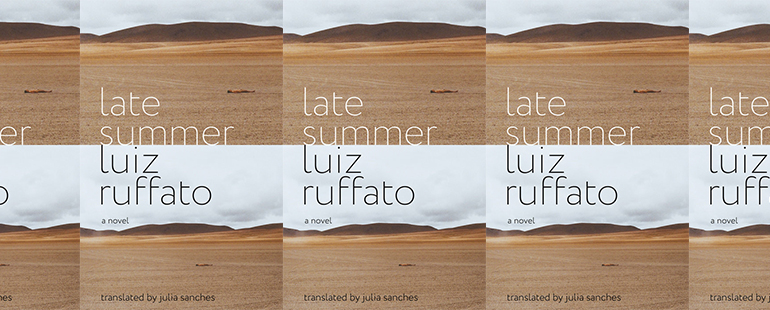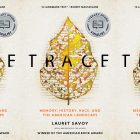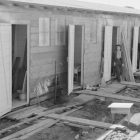Late Summer’s Exploration of the Past

Late Summer, out last month from Brazilian writer Luiz Ruffato in translation from the original Portuguese by Julia Sanches, begins as though in mid-sentence, with a lowercase letter. The narrator, Oséias, is dreaming: the mirage of a desert oasis turns to quicksand in which he sinks, unable to scream. When he is awakened by an alarmed bus driver, he finds that he has arrived at the bus terminal of Cataguases, a small city in southeastern Brazil, where he grew up but has not visited in nearly two decades.
Oséias never explains his purposes for returning to Cataguases; instead, from the beginning to the end of the novel he gives a moment-by-moment account of his activities, thoughts, and feelings—a stream-of-consciousness narrative in which, as the novel progresses, Oséias’s memories of the past become more and more prominent. We learn that he was one of five children, that his mother was a seamstress and his father the manager of the fabric warehouse of Industrial Cataguases, that he moved to São Paulo thirty-five years earlier, that he worked for a farm supply company as a traveling salesman, and that he married and had one child, a son. We learn, too, that his older sister Lígia died by suicide at fifteen, that he is mostly estranged from his remaining siblings, that his parents are dead, that he was fired from his job six years earlier and could never find other work, that his wife has divorced him, and that he has not seen his ex-wife nor his son since the day he signed his divorce papers eight years prior.
These details about Oséias’s past are revealed through memories that intermingle seamlessly with the narrative of his actions, observations, encounters, and dialogue in one nearly continuous stream, with no paragraph breaks. His narrative accounts for every time his shirt or hat are soaked with sweat, every change of clothing, every visit to the bathroom, the odors of every bathroom, every glass of water drunk, and every meal eaten, including those he later throws up, because, as we learn, Oséias has only six months left to live, give or take, due to an illness he never identifies. The only breaks in the narrative occur when Oséias falls asleep, in midsentence or in the middle of a cascade of hypnogogic murmuring:
deliane’s evangelical marcim fonseca’s mayor sizim dad forbade isinha joão lúcio jôjo rosana calls him jôjo to this day rodeiro family plot monkeys eating popcorn nicolau nicolau nico lau lau nico big blue eyes wonder if dona eva’s still alive i’ve had so much rotten luck evil eye what is evil eye feast your eyes on gale of the wind there’s no wind still air hot i’ve got to pee lígia the ground the coffin what have you come here for window open rose-app
What have you come here for? Oséias visits each of his siblings: Rosana, a school principal whose husband is a locally infamous loan shark; Isinha, a seamstress whose husband, as Oséias describes him, is an “alcoholic, unemployed, aggressive, two-timing nuisance”; and João Lúcio, the wealthy founder and owner of a furniture manufacturing company who lives with his wife in nearby Rodeiro, where their mother grew up with her Italian immigrant family. Too, he meets with Marilda, his first girlfriend; Marcim Fonseca, a former classmate who is now the mayor of Cataguases; and Mr. Mendonça, once his art teacher at Colégio Cataguases. For what purpose he goes to see any of these people, including his siblings, Oséias keeps to himself, or perhaps is hidden even from himself. He tells no one that he is dying. He says little about what occupies his mind—the death of Lígia and his abiding guilt about her suicide. He makes no attempt to compensate for or amend his long estrangement from his family. It appears, then, that his seemingly offhand responses when each of his siblings asks what he has come for are thoroughly honest. To Rosana, who demands, “What do you want?” he says, “You may not believe it, Rosana, but I honestly don’t know . . . Maybe all I want is some peace and quiet . . .” To Isinha, who asks, “What have you come to Cataguases for?” he says, “No reason.” And to João Lúcio (and others toward the end of the novel) he says that he is “Just passing through . . .”
Oséias does try to confess—not to his siblings, but to a priest, twice. Both times he finds that the church is locked, and he gives up. After the second attempt, he happens upon his former art teacher, now living alone in squalor and debt; though he does not confess the reason for his guilt, only with Mr. Mendonça does he speak openly about his sister Lígea’s death. “Don’t let the past consume you,” says Mendonça in response. “The past isn’t real. We’ve made it up. What exists is the present. This moment, here and now. . . . There is no past, no future. Just present. Carpe diem!” Mendonça claims that he is happy despite his solitude and poverty; “there’s no point crying over spilled milk,” he says, yet he speaks incessantly of the past—his failed attempt to become an artist, his lost love. After all, the past doesn’t get wiped away, like spilled milk. Its effects extend into the present, where Mendonça lives with the “terrible smell . . . of dampness, cigarette smoke, and cat” in his home, and Oséias lives with only the few contents of his backpack.
And so the past becomes the present, which in Oséias’ narrative, like the dream that begins the novel, seems as unreal as Mendonça claims the past is. Of course, the present hardly exists—moment by moment it becomes the past, dissolving just as consciousness dissolves in sleep. Passive, seemingly without desire, Oséias lets it all go by. “I died with Lígia . . .” he tells Mendonça. “And this is what I’ve become. A body without a soul. That longs for . . . and fears . . . the end . . . His loneliness and disappointment, however, is hardly unique, and he finds that even those who have homes and families and have achieved some measure of success live in a kind of emotional solitude—arranging for regular nights away from their spouses, for example, to accommodate affairs. “Love . . . what is love anyway?” says Rosana. “An emotional attachment that deteriorates year after year . . . I was practical about it. I married without the emotional attachment. Ergo, it didn’t deteriorate. . . . Since I’ve always been happy to just put up with Ricardo, I haven’t gone through all the other stages—disappointment, reconciliation, frustration, reconciliation, depression, resignation, et cetera. I went straight to the end.” I went straight to the end—as though she, too, were already dead.
Toward the end of the novel, Oséias takes up a version of Mendonça’s view of things:
A house’s rooms don’t hold the voices and joys and sorrows of those who lived in it. A house exists only here and now; there is no before or after. You may be able to touch the furniture, the objects, but never the people, much less their stories . . . These houses will one day also crumble, and not even the memory of them will survive. You’re right, Mr. Mendonça, it’s the present that matters . . . But if I were to walk as I am now, anonymously, along the front of the Spartano field, down Rua João Bicalho and through São Sebastião Square, and cross paths with no one, could anyone say I had been in Rodeiro today, when nobody saw me?
When Oséias speaks of crumbling houses, he has his own crumbling body in mind. Like a house, the body does not last—and there is nowhere else to live. In an interview with the Goethe-Institut, in response to the question, “How much ‘home’ do you need?” Ruffato answered, “For me, home is my body.” In part because it is unusual to read a novel in which the narrator gives an account of every glass of water he drinks and every trip to the bathroom he takes, it is this home of the body that is foregrounded in Oséias’s story—the home in which all his thoughts, feelings, memories, conversations, and observations are grounded. Things taste and smell bad, and he sweats profusely, vomits alongside the street, and pees and empties his guts again and again. These discomforts are part one stream of experience, of sorrow; indeed, the prevailing mood is not disgust, but grief and longing. Although everything passes away as though it were never real to begin with, it all matters. That Lígea died matters, and how she died matters very much to Oséias—right up to the novel’s abrupt end.



